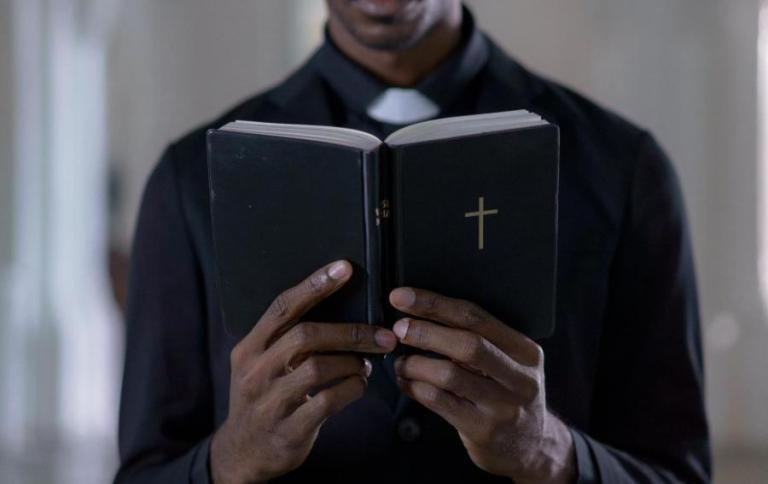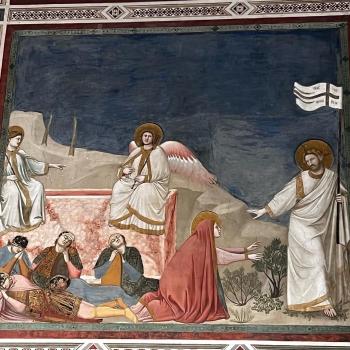Does a husband act like a priest for his family? While not the direct application his sermon, the preacher’s comment was loud and clear: “Women’s roles in the family are important, but men, as the priest of your home, you need to [get your act together, basically, because your behavior will make or break the family.]”

His admonishment is statistically verifiable—husbands and fathers are enormously important to the wellbeing of their families—but the preacher’s description of men as priests caught me unaware. So let’s explore what the Bible says about it.
What is a priest?
A priest is an intermediary between people and a deity. In times past, the average person was not allowed direct access to God but would go through their intermediary, the priest. In the Old Testament, Yahweh instituted the Levitical priesthood to mediate between himself and his people. They performed all rituals, pronounced blessings, and offered atonement for the sin of the people. What qualified them for this role? God’s choosing. Each priest had to meet certain qualifications that God set, and the high priest, in particular, underwent elaborate ritual cleansing before his installation.
When Jesus came along, however, his once-for-all ultimate sacrifice flipped the old way on its head. His death erased the need for another intermediary (Hebrews 7:26–27). A dramatic illustration of this open access happened during the crucifixion: The heavy veil separating the holiest place in the temple, where God’s presence dwelt, tore from top to bottom at the moment of Jesus’s death (Mark 15:37–38). Access to God comes through Jesus now, and it’s free to all who believe.
“For there is one God and one mediator between God and mankind, the man Christ Jesus” (1 Timothy 2:5).
“But you are a chosen people, a royal priesthood, a holy nation, a people belonging to God, that you may declare the praises of him who called you out of darkness into his wonderful light” (1 Peter 2:9).
“And has made us to be a kingdom and priests to serve his God and Father—to him be glory and power forever and ever! Amen” (Rev. 1:6).
Nowhere does any New Testament writer ascribe the title of priest to any individual member in the church. Rather, all believers are God’s representatives, able to intercede for one another, carry one another’s burdens, and witness to those outside the church of Jesus’s all-sufficient grace.
Priesthood of the Believer
A little history here: In the Medieval period, the church was led by priests, who taught that God works through the sacraments (baptism, communion, etc) to bring his truth, blessing, and salvation to his people. Only the ordained priesthood was qualified to oversee those sacraments, and so salvation was said to come through the church. With the Reformation, Martin Luther and other leaders pointed back to Scripture as the source of truth. Only the Bible is inspired and authoritative, they said. Christians are not dependent upon the priests within the church to interpret Scripture for them or affect God’s blessing of forgiveness for them; all Christians are equally priests through Christ and stand upon the same ground before the cross.
Protestants call this the priesthood of the believer, a theology that remains foundational to this day. But if the Bible says that all believers are priests, why would a Protestant preacher talk about men as “priests of the family”?
Cultural Patterns
I suspect he was thinking about the phrase from Ephesians 5, “head of the wife.” If so, he conflated that phrase with another one: head of the home. It sounds biblical, but it’s really secular. Up until 1980, the U.S. Census Bureau designated a husband as “head of household” when he was living with his wife in the same home. Why? Because traditionally the man earned more income to support the family’s expenses. There is a whole history of how the pattern of men as breadwinners came to occur in the U.S. That pattern became disrupted after World War II, and by the 1970s women were so vital to the workforce that even the government had to change its categories to fit reality. Yet even after the Census Bureau changed the phrase to “householder,” the phrase “head of household” remains embedded in American culture.
Combine that with the biblical phrase from Ephesians 5:23, “For the husband is the head of the wife…” and you get a perfect storm of assumption: head of household is the same as “head of wife.” Even more, in this scenario, head is defined as authority or leadership, according to a common English understanding of head. Therefore, the husband must be the authority over the wife.
Biblical Terminology
But understanding the Bible correctly means we must use accurate language. A father indeed holds authority over his children (Prov. 3:12, Deut 6:6), but so does a mother (Deut. 21:18–19; Eph. 6:1–3) who is to be honored accordingly (Exod 20:12; Prov. 1:8). Ephesians 6:1–3 particularly supports the family structure of parents over children. But does Ephesians 5 support the idea of husbands in authority over wives? Answering that question involves Greek grammar and history lessons and is a question for another day. Really, it’s a long post/a whole book in itself.
Back to “priest of the home.” In what way is a husband the spiritual leader in his home? With his kids! Inasmuch as a father leads his children into truth about God, toward a relationship with God, into obedience to God, he is fulfilling his fatherly duty. Possibly, this is what the preacher meant. But the exact same expectation holds true for mothers. In fact, in the American church, children’s spiritual education falls heavily on the shoulders of their mothers. When a child is old enough to begin praying and seeking God, understanding more and more of what the Bible teaches, he or she starts the journey to becoming mature in the faith, and the parents move from leader to mentor to coach to friend.
Conclusion
Does a husband act as a spiritual authority to his wife? As a mediator between her and God? Nothing in Scripture supports such a statement. She does not access God through her husband. He does not pronounce blessing or forgiveness or approval to her on behalf of God. Wives are not only fully capable but fully responsible for their own spiritual health.
But, as sacred siblings, husbands and wives are allies who can encourage one another in godliness, exhort each other toward truth, and stand back-to-back in defense of one another’s walk with God. They are one—what damages one hurts the other. What builds one up will strengthen the other. Instead of laying undue pressure on husbands, let’s equip men and women to live holy, obedient, courageous lives for God.












